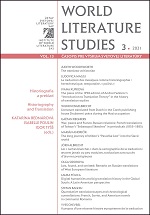The long journey of Milton’s “Paradise Lost” into the Slavic world
The long journey of Milton’s “Paradise Lost” into the Slavic world
Author(s): Marián AndričíkSubject(s): Studies of Literature, Western Slavic Languages, Eastern Slavic Languages, South Slavic Languages, Translation Studies
Published by: SAV - Slovenská akadémia vied - Ústav svetovej literatúry
Keywords: John Milton; Epic; Translation history; Slavic languages; Comparative view; Verse; Prosody; Meaning; Semantic density;
Summary/Abstract: The paper attempts to map translations of Milton’s Paradise Lost into Slavic languages and its place in their cultures from the first Russian and Polish editions to the latest Ukrainian and Slovak ones. The survey shows the shift in the translation method from the earliest prose renderings, usually from other translations, to newer editions with translations in verse. Due to typological differences between languages, especially in semantic density, some translations were substantially longer in comparison with the original. Various types of verse as a replacement of Milton’s blank verse were adopted, depending on the tradition of the target language. From the point of view of contemporary translation studies, corrections of Milton or omissions from the text due to the personal denomination of the translator, as we can see in some earlier Russian or Polish editions, are unacceptable. Attention is also paid to two Czech translations by Josef Jungmann (1811) and Josef Julius David (1911) that have served as a substitution for the non-existing Slovak translation up to the present. Stemming from a typological difference between English and Slavic languages, the paper raises prosodic, semantic, and semiotic problems of translation.
Journal: World Literature Studies
- Issue Year: 13/2021
- Issue No: 3
- Page Range: 68-80
- Page Count: 13
- Language: English

